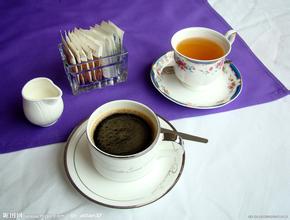A brief introduction to the planting market price of Jamaican Blue Mountain boutique coffee beans with rich fruit flavor

Apart from the above-mentioned enterprises, the coffee beans of other companies, even if they are locally produced in Jamaica, are not authentic Blue Mountain coffee.
Second, inspect the packaging.
The real Jamaican Blue Mountain Coffee is packaged in sealed aluminum foil, wrapped in burlap bags, or in log buckets (only in large quantities). Jamaica is the only country in the world that still retains the barrel packaging of coffee. A pound of fake Blue Mountain coffee on the domestic market is also packed in wooden barrels, which have been treated with paint. Just imagine, coffee is a kind of food that wins by taste. Once it is stained with the smell of paint, how can it be appreciated? Jamaicans are not that stupid, are they?
In addition, except for those sold by UCC, the packaging of real Jamaican Blue Mountain Coffee bears the Blue Mountain Coffee logo, so anything without the Blue Mountain Coffee logo of UCC should be a fake.
Real Blue Mountain coffee is measured in ounces and pounds, generally 2 ounces, 4 ounces, 8 ounces (half pound), 12 ounces, 16 ounces (one pound); packages measured directly in pounds or kilograms are basically fake.
Third, the inspection level
Blue Mountain Coffee is divided into five grades, namely, selected Peaberry, Gradel, Grade2, Grade3 and preferred Blue Mountain, while fake Blue Mountains in the domestic market often have AAA, AA and A-level logos, which are totally irrelevant and must be fake. It must be fake, because there has never been these grades of Blue Mountain Coffee.
Fourth, verify the price.
Real Blue Mountain coffee is expensive, if you buy 300 yuan a pound, or cheaper Blue Mountain coffee, you can basically buy a fake.
Fifth, check the appearance.
The raw beans of Blue Mountain Coffee are cyan, neat in shape, medium in size, slightly upwarped at both ends of the beans, expanded in volume after baking, and full and round in shape.
Sixth, grinding condition
Blue Mountain Coffee grows at high altitude, and the cytoplasmic structure of its raw beans is relatively loose. When grinding with a manual bean grinder, it will have an obvious sense of crispness, and there is almost no sense of stopping and stiff.
Seventh, identify aroma.
Blue Mountain Coffee has a strong aroma of fruit and chocolate (also thought to be creamy). The roasted blue mountain coffee beans have a rich and calm aroma, while those mixed with other varieties of the so-called blue mountain coffee, the aroma is frivolous, there is no sense of gravity, and is easy to dissipate.
Eighth, taste the taste
The taste of Blue Mountain Coffee is smooth, giving the taste buds a mellow feeling, perfect, while the fake Blue Mountain, either the taste is thin, or the irritation is too strong, always can not find the most balanced feeling
The best Blue Mountain Coffee is undoubtedly one of the best. Although the price can ensure an adequate supply of Blue Mountain coffee, it does not guarantee the best flavor of the coffee. Also, this kind of coffee tastes much more expensive than it looks. If you want to taste its best flavor, you have to put more coffee beans than other coffee, otherwise the flavor will be a little different, so the flavor is that it has 10% to 15% more coffee beans than the coffee whose price is inferior to it.
The real Blue Mountain Coffee is made from the best local raw coffee beans, which is the fun of tasters. Its flavor is rich, balanced, fruity and sour, and can meet people's various needs. In addition, the high-quality fresh Blue Mountain coffee has a long-lasting flavor, as drinkers say, with a lingering aftertaste.
The best blue mountain coffee beans are NO.1 peaberry, also known as pearl beans, which are carefully selected small round beans and boutique products at an altitude of 2100 meters.
Flavor
The nose is very full-bodied, with persistent fruity flavours.
Granule
The particles are fuller.
Baking method
Moderate baking
The caffeine content of Blue Mountain Coffee is very low, which is less than half of that of other coffees, which is in line with the modern concept of health.
In 1950, the Government of Jamaica established the Jamaica Coffee Industry Committee (the Jamaica Coffee Industry Board), which sets quality standards for Jamaican coffee and oversees the implementation of quality standards to ensure the quality of Jamaican coffee. The Commission awarded special official seals to raw and roasted coffee exported from Jamaica, which is the highest-level national coffee institution in the world. The origin of Blue Mountain Coffee can be represented by Mavis Bank Coffee Factory (M.B.C.F), Blue Mountain Coffee Co-operative Factory (M.H.C.C.T.), Portland Blue Mountain Coffee Cooperative Factory (P.X.X.S.H.), Coffee Industry Association (Wallenford), Coffee Industry Association (St. John Peak) and J.A.S.
By 1969, the situation had improved because the use of Japanese loans had improved the quality of production, thus ensuring the market. By now, this kind of coffee has reached the point of being feverishly loved.
By 1981, about 1500 hectares of land in Jamaica had been reclaimed for coffee cultivation, followed by the opening of another 6000 hectares of coffee land. In fact, today's Blue Mountain area is a small area with a planting area of only 6000 hectares, and it is impossible to grow all the coffee marked "Blue Mountain" there. Another 12000 hectares of land is used to grow two other types of coffee: Alpine top coffee and Jamaican premium coffee.
The "secret" of why Blue Mountain coffee tastes pure: their coffee trees are all on rugged hillsides, and the picking process is so difficult that non-local skilled women are simply unable to do it. It is very important to choose the right ripe coffee beans when picking. Immaturity or ripeness will affect the quality of the coffee. The picked coffee beans are shelled on the same day, and then let them ferment for 18 hours. After that, the coffee beans were cleaned and screened. After that
The drying process must be carried out on the cement floor or on a thick blanket until the humidity of the coffee beans drops to 12% 14%. And then store it in a special warehouse. Take it out and roast when needed, then grind it into powder. These procedures must be strictly mastered, otherwise, the quality of coffee will be affected.
For the current domestic coffee market where there is a mixture of good and bad coffee and those fake and shoddy coffee that are difficult to prevent, we must always be vigilant, fully understand and master the relevant knowledge and understand the remarkable characteristics of Blue Mountain Coffee in order to identify its authenticity.
First, confirm the origin and brand
Some friends may think that this is nonsense. Blue Mountain Coffee is naturally made in Jamaica. Do you still need to confirm it? True, but don't forget that the Blue Mountain caffeine sold in Asia is monopolized by Japan's UCC, so almost all of them bear the trademark of UCC. Therefore, except for the Blue Mountain Coffee imported directly from Jamaica, the authentic Blue Mountain Coffee seen in the Asian market should be "UCC" brand, except for the direct imports of Japan UCC and Jamaica. Other Blue Mountain Coffee in the domestic market can basically be considered fake.
With regard to the brand of Blue Mountain Coffee, we know that "Blue Mountain Coffee" is only a general term for high-quality coffee in the Blue Mountain region of Jamaica, which is divided into different brands according to the production enterprises. in Jamaica, only enterprises confirmed and approved by the Coffee Industry Bureau are qualified to export Blue Mountain Coffee. The specific list is as follows:
1.A1 Coffee Limited
2.Coffee Beans of Jamaica Limited
3.Farms Consolidated Limited
4.Jablum Jamaica Limited (Also exporter of roasted coffee)
5.Newcastle Blue Mountain Coffee Growers Cooperative Society
6.Premier Coffee Trading Co.Ltd
7.Supreme Jamaica Coffee Corporation
8.Coffee Traders International Limited
9.Jamaica Coffee Corporation
10.Jamaica Standard Products Co.Ltd
11.Blue Mountain Coffee Cooperation
12.RWS Estates Limited
13.Mavis Bank Central Factor Limited
14.Salada Foods Jamaica Limited
15.Premier Coffee Trading Co.Ltd
16.Coffee Roasters of Jamaica Limited
Important Notice :
前街咖啡 FrontStreet Coffee has moved to new addredd:
FrontStreet Coffee Address: 315,Donghua East Road,GuangZhou
Tel:020 38364473
- Prev

A brief introduction to the Origin, Development, History and Culture of Jamaica Blue Mountain Fine Coffee beans
The Commission awarded special official seals to raw and roasted coffee exported from Jamaica, which is the highest-level national coffee institution in the world. The origin of Blue Mountain Coffee can be represented by Mavis Bank Coffee Factory (M.B.C.F), M.H.C.C.T., P.X.X.S.H., and the coffee industry.
- Next

A brief introduction to the planting situation, geographical location, climate and altitude of high-quality coffee beans in the blue mountains of Jamaica
Its liquid is golden in the sun and tastes smoothly. According to the coffee book, Blue Mountain is the only coffee in the world that is both sour and bitter and can be enjoyed by people. If you drink it, you will understand that Blue Mountain Coffee has the characteristics of all good coffee. Not only the taste is rich and mellow, but also because of the perfect combination of sweet, sour and bitter coffee, it has no bitter taste at all, only moderate and perfect.
Related
- Detailed explanation of Jadeite planting Land in Panamanian Jadeite Manor introduction to the grading system of Jadeite competitive bidding, Red bid, Green bid and Rose Summer
- Story of Coffee planting in Brenka region of Costa Rica Stonehenge Manor anaerobic heavy honey treatment of flavor mouth
- What's on the barrel of Blue Mountain Coffee beans?
- Can American coffee also pull flowers? How to use hot American style to pull out a good-looking pattern?
- Can you make a cold extract with coffee beans? What is the right proportion for cold-extracted coffee formula?
- Indonesian PWN Gold Mandrine Coffee Origin Features Flavor How to Chong? Mandolin coffee is American.
- A brief introduction to the flavor characteristics of Brazilian yellow bourbon coffee beans
- What is the effect of different water quality on the flavor of cold-extracted coffee? What kind of water is best for brewing coffee?
- Why do you think of Rose Summer whenever you mention Panamanian coffee?
- Introduction to the characteristics of authentic blue mountain coffee bean producing areas? What is the CIB Coffee Authority in Jamaica?

